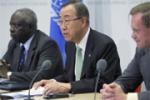Haiti Food Security Update (5/3/2008)
 With an Agronomist for a President and now an Economist for a Prime Minster, we hope that the Haitian government will address the food crisis head on. The Government will need to articulate short term measures and a long term plan to the Haitian public, to donors, and the international community. Preval has spent a great deal of time talking about national production - but this will not be possible without halting and reversing envrinmental degradation. Fortunately, Haiti continues to draw support from major donors. This will allow the government some time to establish new policies and programs.
With an Agronomist for a President and now an Economist for a Prime Minster, we hope that the Haitian government will address the food crisis head on. The Government will need to articulate short term measures and a long term plan to the Haitian public, to donors, and the international community. Preval has spent a great deal of time talking about national production - but this will not be possible without halting and reversing envrinmental degradation. Fortunately, Haiti continues to draw support from major donors. This will allow the government some time to establish new policies and programs.
 Food insecurity continues to receive attention at the highest levels of the United Nations. On April 29th, Secretary-General Ban Ki-moon announced he will personally lead a task force to coordinate the efforts of the UN system in addressing the global food crisis. Members of the Task Force will be drawn from throughout the international community. Under-Secretary-General for Humanitarian Affairs John Holmes and Senior UN System Influenza Coordinator David Nabarro in Geneva have accepted positions as Coordinators. Meetings begin this month.
Food insecurity continues to receive attention at the highest levels of the United Nations. On April 29th, Secretary-General Ban Ki-moon announced he will personally lead a task force to coordinate the efforts of the UN system in addressing the global food crisis. Members of the Task Force will be drawn from throughout the international community. Under-Secretary-General for Humanitarian Affairs John Holmes and Senior UN System Influenza Coordinator David Nabarro in Geneva have accepted positions as Coordinators. Meetings begin this month.
 According to the announcement, the Food and Agriculture Organization (FAO) has proposed an emergency initiative to provide low-income countries with the seeds and inputs to boost production and is calling for $1.7 billion in funding. The International Fund for Agricultural Development (IFAD) is making available an additional $200 million to poor farmers in the most affected countries to boost food production.
According to the announcement, the Food and Agriculture Organization (FAO) has proposed an emergency initiative to provide low-income countries with the seeds and inputs to boost production and is calling for $1.7 billion in funding. The International Fund for Agricultural Development (IFAD) is making available an additional $200 million to poor farmers in the most affected countries to boost food production.
 Back to Haiti. On April 29th, Jesse Jackson visited Haiti and called for debt relief. Jackson highlighted debts that Haiti owes the World Bank and the Inter-American Development Bank totalling about $1.5 billion - whcih means debt payments of about $70 million a year. Given the current situation, these funds could be spent on a combination of subsidies, inputs for the agricultural sector, reforestation, etc. Jackson asked Congress to declare "an emergency alert" for Haiti, stating that the response thus far from the international community and from the United States has been inadequate.
Back to Haiti. On April 29th, Jesse Jackson visited Haiti and called for debt relief. Jackson highlighted debts that Haiti owes the World Bank and the Inter-American Development Bank totalling about $1.5 billion - whcih means debt payments of about $70 million a year. Given the current situation, these funds could be spent on a combination of subsidies, inputs for the agricultural sector, reforestation, etc. Jackson asked Congress to declare "an emergency alert" for Haiti, stating that the response thus far from the international community and from the United States has been inadequate.
 The Inter-American Development Bank subsequently announced last week that it would give $27 million in grant (not loaned) money to Haiti to deal with higher global food prices and to revive agricultural production. The President of the Bank Luis Alberto Moreno stated, "It's crucial for the IADB to support Haiti's efforts to aid its most vulnerable citizens." If that is the case, then how about cancelling Haiti's debt?
The Inter-American Development Bank subsequently announced last week that it would give $27 million in grant (not loaned) money to Haiti to deal with higher global food prices and to revive agricultural production. The President of the Bank Luis Alberto Moreno stated, "It's crucial for the IADB to support Haiti's efforts to aid its most vulnerable citizens." If that is the case, then how about cancelling Haiti's debt?
 On May 1st, President Bush called for $770 million in new U.S. food aid donations and other measures to address the global food crisis. According to Bush, "... we're sending a clear message to the world that America will lead the fight against hunger for years to come." The proposed breakdown of funding would look like this: $395 million in emergency food aid, $225 million for food vouchers, seeds, or local purchases in the developing world, and $150 million for development programs that promote food security. If accepted by Congress, a portion of this funding would certainly be dedicated to Haiti.
On May 1st, President Bush called for $770 million in new U.S. food aid donations and other measures to address the global food crisis. According to Bush, "... we're sending a clear message to the world that America will lead the fight against hunger for years to come." The proposed breakdown of funding would look like this: $395 million in emergency food aid, $225 million for food vouchers, seeds, or local purchases in the developing world, and $150 million for development programs that promote food security. If accepted by Congress, a portion of this funding would certainly be dedicated to Haiti.
 An increasingly vocal group of non governmental organizations, advocacy groups and policy makers are asking Congress to loosen restrictive rules for food aid. The United States is the largest donor of food aid by far but much of this is provided in the form of agricultural surplus which must be shipped to food insecure areas throughout the world. That costs time and money. With cash assistance, the World Food Programme (WFP) can buy food in the countries and regions where they are working. This allows them to support (instead of undermining) local economies while meeting the food needs of the vulnerable.
An increasingly vocal group of non governmental organizations, advocacy groups and policy makers are asking Congress to loosen restrictive rules for food aid. The United States is the largest donor of food aid by far but much of this is provided in the form of agricultural surplus which must be shipped to food insecure areas throughout the world. That costs time and money. With cash assistance, the World Food Programme (WFP) can buy food in the countries and regions where they are working. This allows them to support (instead of undermining) local economies while meeting the food needs of the vulnerable.
 Here are some other articles which may be of interest. Click here to read an interview in Business Week with the Director of the WFP, Josette Sheeran. For background on how the global food crisis came to be and what could be done about it check out an article by Jake Cadwell, Director of Policy for Agriculture, Trade, and Energy at the Center for American Progress here. For an article in Financial Times about how this crisis presents an opportunity to reform the global agriculture system, click here.
Here are some other articles which may be of interest. Click here to read an interview in Business Week with the Director of the WFP, Josette Sheeran. For background on how the global food crisis came to be and what could be done about it check out an article by Jake Cadwell, Director of Policy for Agriculture, Trade, and Energy at the Center for American Progress here. For an article in Financial Times about how this crisis presents an opportunity to reform the global agriculture system, click here.
 I have to get something off my back. I recently saw a clip by Al Jazeera on food insecurity and envrionmental degradation in Haiti. I found it to be very lazy reporting and it reminds me of endless pieces which are produced in the following way: First, send a journalist to Port au Prince for one or maybe two days. Be sure to open with an image of someone living in abject misery. A garbage dump is preferable. Highlight that Haiti is the poorest country in the Western Hemisphere (c) and is only an hour and a half from Miami. Stay in nice hotels and talk to government sources. Fixate on conflict in Port au Prince as opposed to the peaceful countryside. Mention that some Haitians eat clay biscuits. Note the vibrant culture. Don't ask Haitians what they think, especially those from rural areas. Point out all the challenges but don't highlight what is working and definitely do not offer any solutions. Blame the poor for cutting down trees when in reality they dont have a choice.
I have to get something off my back. I recently saw a clip by Al Jazeera on food insecurity and envrionmental degradation in Haiti. I found it to be very lazy reporting and it reminds me of endless pieces which are produced in the following way: First, send a journalist to Port au Prince for one or maybe two days. Be sure to open with an image of someone living in abject misery. A garbage dump is preferable. Highlight that Haiti is the poorest country in the Western Hemisphere (c) and is only an hour and a half from Miami. Stay in nice hotels and talk to government sources. Fixate on conflict in Port au Prince as opposed to the peaceful countryside. Mention that some Haitians eat clay biscuits. Note the vibrant culture. Don't ask Haitians what they think, especially those from rural areas. Point out all the challenges but don't highlight what is working and definitely do not offer any solutions. Blame the poor for cutting down trees when in reality they dont have a choice. Haiti Innovation strives to identify choices, what it would take for Haitians to have access to them, and what kind of coordination would be needed to make it happen. We try to learn from the failures AND successes we have seen throughout Haiti. In the months to come, we will make a special effort to reach out to Haitians in Haiti and abroad who are involved in agriculture and environmental preservation - prerequisites for food security. We are currently putting together a list of interviewees and, of course, welcome your input.
Haiti Innovation strives to identify choices, what it would take for Haitians to have access to them, and what kind of coordination would be needed to make it happen. We try to learn from the failures AND successes we have seen throughout Haiti. In the months to come, we will make a special effort to reach out to Haitians in Haiti and abroad who are involved in agriculture and environmental preservation - prerequisites for food security. We are currently putting together a list of interviewees and, of course, welcome your input.
Add new comment